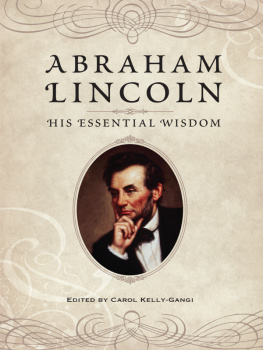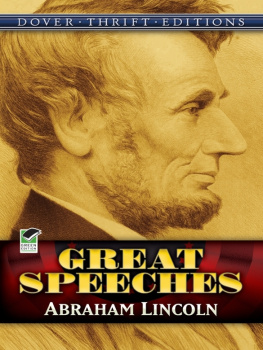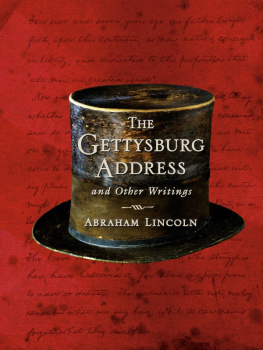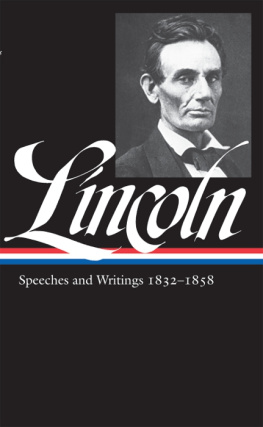
ABRAHAM
LINCOLN
HIS ESSENTIAL WISDOM

EDITED BY
CAROL KELLY-GANGI

To my brother Tom with love
whose integrity and honesty I greatly admire.
A special thanks to my parents Gwen and Howard Kelly, Marianne Kelly, and Beverly Lindh for sharing not only their books on Lincoln, but their insights as well. And as always, thanks to my husband John, for his shared love of history and for all of his valuable contributions.

Compilation 2007 by Fall River Press
All rights reserved. No part of this publication may be reproduced, stored in a retrieval system, or transmitted, in any form or by any means, electronic, mechanical, photocopying, recording, or otherwise, without prior written permission from the publisher.
Fall River Press
122 Fifth Avenue
New York, NY 10011
ISBN: 978-0-7607-9252-0
Sterling eBook ISBN: 978-1-4351-3304-4
10 9 8 7 6 5 4
The quotes in this book have been drawn from many sources, and are assumed to be accurate as quoted in their previously published forms. Although every effort has been made to verify the quotes and sources, the Publisher cannot guarantee their perfect accuracy.
Contents
Born, February 12, 1809, in Hardin County, Kentucky.
Education defective.
Profession, a lawyer.
Have been a captain of volunteers in Black Hawk War.
Postmaster at a very small office.
Four times a member of the Illinois legislature, and was a member of the lower house of Congress.
Abraham Lincoln

B ASED ON LINCOLNS OWN autobiographical entry written in June of 1858 for the Dictionary of Congress, it seems unimaginable that in less than three years, he would find himself elected to the office of the President of the United States. Indeed, in highlighting only the most basic facts from his life, Lincoln seemed unaware that by June of 1858, he had risen far above local prominence.
But for a single occurrence that touched off a sequence of events that would ultimately lead Lincoln to the White House, his political life could very well have ended in a more or less lackluster fashion. In the spring of 1849, Lincoln had finished his term in the U.S. House of Representatives and in keeping with a promise he had made to serve only one term, he did not seek reelection. Rather, he returned to Springfield and resumed his law practice. As his reputation for being an excellent lawyer thrived, so did his legal practice. He was representing prestigious clients, including banks, insurance companies, and the powerful Illinois Central Railroad, and he appeared regularly before the Illinois Supreme Court.
His family was also expanding, with Mary giving birth to sons William and Tad after losing son Edward, who died after a two-month illness when only a toddler. Later admitting that his interest in politics was waning at this point, Lincoln may well have slipped back into private life for good.
But on May 30, 1854, an event happened that Lincoln later said astounded him leaving him thunderstruck and stunned. It was also the catalyst that Lincoln needed to re-ignite his interest in politics and eventually focus national attention on him. It was the passage of the Kansas-Nebraska Act, which had been introduced in Congress earlier in the year by Lincolns longtime political rival, Stephen A. Douglas. The Act allowed the settlers in the territories of Kansas and Nebraska to determine whether or not slavery would be allowed within their borders. It thus rendered the Missouri Compromise of 1820, the longstanding agreement prohibiting the extension of slavery, inoperative and void. Speaking at a Whig convention later that summer, Lincoln attacked the Act calling it a great wrong and injustice. For the fifth time, Lincoln was elected to the Illinois State legislature, but declined the seat in order to make a bid for the Senate. Though he lost the Senate race, having thrown his supporters to an anti-Nebraska Democrat to prevent a win by a Douglas-supported Democrat, he continued his course of action in vigorously denouncing the Kansas-Nebraska Act and the extension of slavery at every opportunityall the while gaining more and more attention, admiration, and supporters.
Within two years, Lincoln would make another bid for the Senate, this time for the seat held by Douglas himself. During the campaign, Lincoln invited Douglas to a series of seven debates in various locations throughout the state. The debates were wildly successful with an average of ten to fifteen thousand people in attendance to hear Lincoln and Douglas in their heated exchange over the issue that was causing a firestorm of controversy in the nation.
Although Douglas won the Senate seat by a slim margin, the debates had served to thrust Lincoln into the national spotlight. In a brilliant political move, Lincoln actively lobbied to have his scrapbook of clippings and major speeches of the debates published in book form in 1860. It became an immediate best-seller. So it was, that within sixteen months of losing the Senate race, Lincoln was nominated as the Republican presidential candidate.
The challenges and seemingly insurmountable odds that Lincoln faced in politics he also faced regularly in other areas of his life. His impoverished beginnings and his familys struggle for survival from their meager crops marked his earliest years. Then, at the age of nine, Lincoln lost his beloved mother, Nancy Hanks Lincoln. His father, Thomas, remarried a widow with three children, Sarah Bush Johnston, a year later. She proved to be a wonderful choice for Thomas and his family and raised the Lincoln children with love and affection. Lincolns self-described defective education consisted of brief stints in log-house schools along with his sister Sarah when he was a boy. He learned to read, write, and cipher to the Rule of Three; but that was all. The remainder of what he learned, he taught himself under the pressure of necessity. He read the family Biblewhich would provide him with comfort and reassurance for the balance of his lifeShakespeare, and whatever books he could borrow from friends between plowing, planting, and working as a hired hand for neighbors.
Lincoln moved to Illinois with his family in 1830, and made his first known political speech to promote better navigation along the Sangamon River. The following year, he moved to New Salem on his own. He worked as a store clerk, made friends, and gained the respect of the local men, in part after wrestling the leader of a local gang to a draw. In 1832, Lincolns mettle was further tested in the Black Hawk War, where he was elected the company captain, a success that gave him great personal satisfaction. Later that year, Lincoln ran for the Illinois General Assembly. He lost the election, but it was, as he pointed out, the only time hed ever been beaten by the people.
In 1833, Lincoln was left deep in debt after a general store that hed opened with a partner failed. In need of money, he began writing deeds and mortgages for neighbors and worked as a hired hand. He was later appointed postmaster of New Salem, and then the deputy surveyor for the County. The following year, Lincoln was elected to the Illinois General Assembly, and began in earnest his study of law. Without the benefit of any higher education or mentors, Lincoln studied Blackstones
Next page















